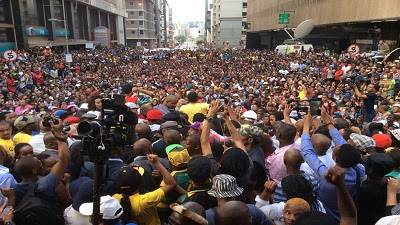Michael - Thursday
 |
| Protest at the University of Cape Town |
The last months have seen a concerted push by students
around the country in the Fees Must Fall campaign. Initiated at the end of last
year in response to the large fee increases proposed by the universities, it was successful
in getting the government to agree to fund part of the increase and the
universities to eat the shortfall. Somewhere along the line, the demand
changed from no increases, to reducing fees, and finally to free tertiary
education.
 |
| Protest at the University of the Witwaterstand |
I’ve been a staff member in one form or another at the
University of the Witwatersrand in Johannesburg for 44 years, so I
have a lot of myself invested in the institution and its future is of real
concern to me. It has transformed dramatically over those years from a largely
segregated institution where 90% of the students and almost all the staff were
white, to a university three times the size with a multiracial and
multinational staff body and a student body whose racial makeup pretty well
reflects that of the surrounding Gauteng province that it serves. It also hosts
many international students, mainly from Africa. It does stronger research and
has better students and courses than it did in the eighties.
The current scenes of police all over the campus supporting
private security personnel and massive student protests remind some people of
the demonstrations against the apartheid government in the eighties. But the
comparison is wrong for a variety of reasons of which the most important is
that then the university and the students were on the same side. Although the
university has tried to align itself with the students by declaring that it’s in favor of “free,
quality, decolonialized higher education”, the students are too savvy to fall
for that. If that’s so, they say, then join our protest. Close your doors until
the government agrees to exactly that. Our university has refused to do so—90%
of staff and 75% of students want to finish the academic year and write the final exams.
Small groups of students (and others) break up classes, damage property, set fires and throw stones. I have to say that I’m disgusted by much of the violent
protest. Sometimes it consists of bullying—often targeting on female staff and
students. Fire extinguishers have been used to break up classes. A cleaner
subsequently died from the fumes. Firecrackers of the most explosive type are
hurled into classes. A student of one of my colleagues was burned in three
places on her leg. Buses and cars have been vandalized and destroyed. This week
a fire was started on a bus transporting 15 students. Thankfully, it was
spotted, the bus stopped, and the students evacuated; they could all have died. That isn’t robust
protest, it’s nothing short of terrorism.
And what is the government doing while all this is going
on? The president too has urged the students that he hears them, that he’s on
their side, that their aim of free higher education is just and reasonable and one the
government supports. So there's no need for violence, no need for protest
aimed at wrecking the academic year. Another stakeholder trying to get on the
right side of the students by supporting what he has no intention of
delivering. (He has other things on his mind.)
 |
| Protest at Parliament |
How “just and reasonable” are the student’s demands? Free higher education is almost certainly unaffordable in South Africa which is beset by
needs from poverty, healthcare, primary education, through to crushing
unemployment, to say nothing of the president’s new mansion. But fees have
increased rapidly ahead of inflation, and bursaries are inadequate for the total of fees, living,
and other costs. Furthermore, sometimes students are denied bursaries on the
grounds that their family income is too high. Yet that calculation takes into
account the income of siblings who may have their own financial stresses and have
no obligation and no intention of supporting a brother or sister at university.
The administration of the national loan scheme is hopeless, with students
sometimes being excluded because their loan payments are delayed. Banks also
loan students money but they want it back! (People in the US are well aware of
how that may play out.) The students don’t need platitudes, the system is broken
and they need it fixed.
Also there is another aspect. When asked at his recent book launch to comment on the student unrest, Athol Williams, a self-made man by any standard, said that it reflected a deep disillusion of South Africa's youth who feel failed by the new South Africa. That goes way beyond the issue of fees.
It’s the universities that will be the meat in this
sandwich, being squeezed between student demands and government priorities and ineptitude.
Research will decline, good staff will go elsewhere. Well-healed students will
take themselves off to private universities as they have with private secondary
schools already. Take the ‘h’ out of the first word of this blog's title.
Still, violent student protests have occurred throughout the
world. Sometimes things are achieved, sometimes not. Yet the universities have survived. I hope.


















New York Times article today about racist slogans being posted in South AFrica and a resurgence of extreme racism, discussion of making that illegal as some countries have done. I'm all for it after all the millions of Africans have suffered through.
ReplyDeleteWish that existed here.